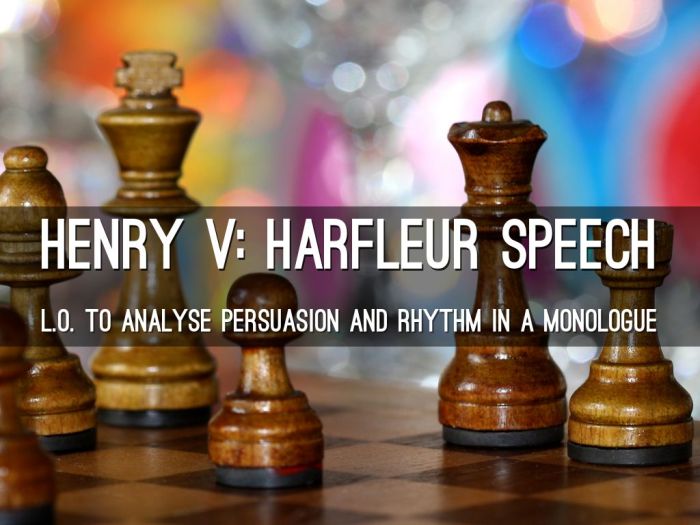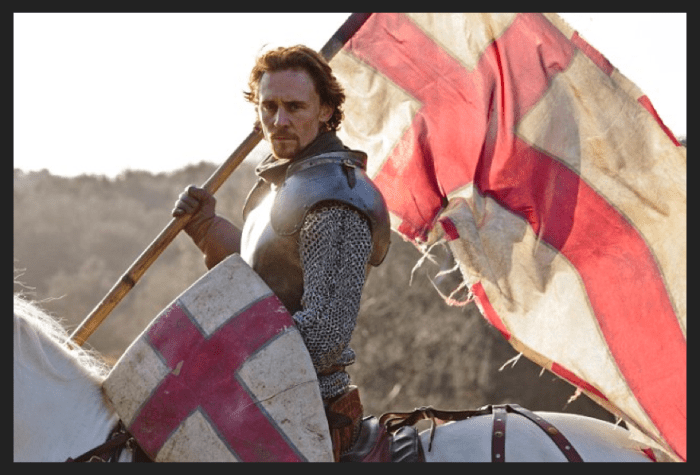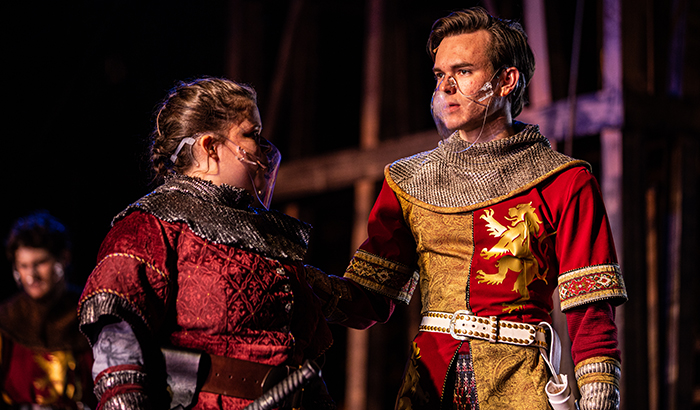Immerse yourself in the captivating world of “You Noblest English Henry V,” where history, literature, and human spirit intertwine to create a narrative that resonates across centuries. From the battlefield of Agincourt to the depths of Henry V’s character, this exploration delves into the complexities of leadership, courage, and the enduring power of words.
Join us as we embark on a journey through the historical context, character analysis, literary devices, and profound themes embedded within this iconic quote. Discover the impact it has had on the play’s reception and its lasting legacy throughout history.
Historical Context

The quote “you noblest English” appears in the play Henry V, which depicts the English victory at the Battle of Agincourt in 1415. This battle was a significant turning point in the Hundred Years’ War between England and France.
Battle of Agincourt
The Battle of Agincourt took place on October 25, 1415, near the village of Agincourt in northern France. The English army, led by King Henry V, was outnumbered by the French army by a factor of three to one. However, the English used superior tactics and weaponry to defeat the French in a decisive victory.
The Battle of Agincourt had a profound impact on the course of the Hundred Years’ War. It boosted English morale and gave them the confidence to continue fighting. It also weakened the French monarchy and led to a period of political instability in France.
Character Analysis of Henry V: You Noblest English Henry V

Henry V is a complex and multifaceted character. He is a brave and skilled warrior, but he is also a ruthless and ambitious king. He is a devout Christian, but he is also capable of great cruelty. He is a loving son, but he is also a distant and aloof father.
Henry V’s character is often seen as a reflection of the times in which he lived. The Hundred Years’ War was a time of great violence and upheaval, and Henry V was a product of his environment. He was a man who was shaped by war, and he was willing to use any means necessary to achieve victory.
Henry V’s Speech Before the Battle of Agincourt, You noblest english henry v
One of the most famous examples of Henry V’s character is his speech before the Battle of Agincourt. In this speech, Henry V rallies his troops by reminding them of their duty to God and their country. He tells them that they are fighting for a just cause, and that they should not be afraid to die.
Henry V’s speech is a powerful example of his leadership skills. He is able to inspire his troops by appealing to their sense of duty and honor. He also shows that he is not afraid to put himself in danger, and that he is willing to fight alongside his men.
The Battle of Agincourt was a great victory for Henry V and his army. It is a testament to his character and his leadership skills. Henry V’s speech before the battle is a reminder of the power of words and the importance of leadership.
Literary Analysis of the Quote

King Henry V’s famous speech before the Battle of Agincourt is a powerful and moving piece of oratory. It is full of literary devices that enhance its meaning and impact. These devices include:
- Metaphor:Henry compares his soldiers to “band of brothers” and “we happy few.” These metaphors create a sense of unity and camaraderie among the troops.
- Simile:Henry says that his soldiers will fight “with hearts of fire.” This simile conveys the intensity and passion of the soldiers’ fighting spirit.
- Anaphora:Henry repeats the phrase “we few” several times throughout the speech. This repetition creates a sense of urgency and emphasizes the small size of the English army.
- Alliteration:Henry uses alliteration in the phrase “band of brothers.” This alliteration creates a sense of rhythm and flow in the speech.
These literary devices combine to create a powerful and moving speech that inspires the English soldiers to fight bravely and win the Battle of Agincourt.
Role of the Quote in the Play’s Overall Narrative
Henry’s speech is a turning point in the play. It comes at a moment when the English army is facing overwhelming odds. The French army is much larger and better equipped, and the English are outnumbered by more than three to one.
You noblest english henry v, how are you this fine day? I do hope you’re not too busy conquering France. In the meantime, may I interest you in some information about bells of ireland vase life ? It’s a fascinating topic, and I’m sure you’ll find it most informative.
Now, back to your conquest!
Henry’s speech gives his soldiers the courage and determination they need to overcome these odds and win the battle.
The speech also foreshadows Henry’s eventual victory over the French. In the speech, Henry says that “we few, we happy few, we band of brothers” will “be remembered in this day to be the men who stood between England and her enemies.”
This prophecy comes true at the end of the play, when Henry leads the English to victory at the Battle of Agincourt.
Themes and Symbolism

The quote from Henry V explores several key themes that are central to the play, including honor, courage, and leadership. These themes are explored through the actions and words of the characters, as well as through the play’s symbolism.
One of the most important themes in the play is honor. Henry V is a man who values his honor above all else, and he is determined to prove himself worthy of the English throne. This is evident in his speeches to his troops, in which he urges them to fight bravely and to defend their honor.
The play also explores the theme of courage, as Henry V and his men face overwhelming odds on the battlefield. Despite the dangers, they remain steadfast in their determination to win the battle.
Another important theme in the play is leadership. Henry V is a natural leader, and he is able to inspire his men to follow him into battle. He is also a wise and just ruler, and he is able to unite the English people behind him.
The play explores the importance of good leadership, and it shows how a strong leader can make a difference in the lives of his people.
In addition to these themes, the play also uses symbolism to convey its meaning. For example, the play’s title, Henry V, is symbolic of the king’s role as the leader of England. The play also uses the image of the lion to symbolize Henry V’s strength and courage.
These symbols help to create a rich and meaningful play that explores important themes about honor, courage, and leadership.
Honor
Honor is a central theme in Henry V. Henry is a man who values his honor above all else, and he is determined to prove himself worthy of the English throne. This is evident in his speeches to his troops, in which he urges them to fight bravely and to defend their honor.
For example, in his famous St. Crispin’s Day speech, Henry tells his men that they are “band of brothers” and that they will “be remembered forever” if they fight bravely.
Henry’s sense of honor is also evident in his relationship with his father, King Henry IV. Henry IV is a weak and indecisive king, and he has failed to live up to the expectations of his people. Henry V is determined to restore the honor of the English monarchy, and he does so by leading his troops to victory in the Battle of Agincourt.
Courage
Courage is another important theme in Henry V. Henry is a brave and courageous leader, and he is able to inspire his men to follow him into battle. Despite the overwhelming odds, Henry and his men remain steadfast in their determination to win the battle.
This is evident in the play’s many battle scenes, in which Henry and his men fight bravely against the French.
Henry’s courage is also evident in his personal life. He is not afraid to stand up for what he believes in, even when it is unpopular. For example, Henry is willing to risk his life to defend the honor of his country.
Leadership
Leadership is a third important theme in Henry V. Henry is a natural leader, and he is able to inspire his men to follow him into battle. He is also a wise and just ruler, and he is able to unite the English people behind him.
This is evident in the play’s many scenes in which Henry interacts with his troops and his people.
Henry’s leadership is also evident in his relationship with his father, King Henry IV. Henry IV is a weak and indecisive king, and he has failed to live up to the expectations of his people. Henry V is determined to restore the honor of the English monarchy, and he does so by leading his troops to victory in the Battle of Agincourt.
Comparisons and Contrasts

Henry V’s St. Crispin’s Day speech is a stirring and memorable piece of oratory that has been compared to other famous speeches from literature and history. It shares similarities with speeches such as Winston Churchill’s “We Shall Fight on the Beaches” speech, which also rallied a nation in the face of adversity.
Both speeches use vivid imagery, powerful language, and an emotional appeal to inspire their audiences.
Contrast with Other Leaders
Henry V’s character and leadership style have been contrasted with those of other historical and fictional leaders. Some have compared him to Alexander the Great, who was also a young and ambitious military leader. However, Henry V was more cautious and calculating than Alexander, and he placed a greater emphasis on diplomacy and negotiation.
Henry V has also been compared to fictional leaders such as Aragorn from The Lord of the Ringsand King Arthur from the Arthurian legends. Like these characters, Henry V was a noble and virtuous leader who inspired loyalty and devotion from his followers. However, he was also a flawed and complex character, capable of both great heroism and great cruelty.
Impact and Legacy

The quote, “Once more unto the breach, dear friends, once more,” has had a profound impact on the play’s reception and its lasting legacy. It has become one of the most iconic lines in all of Shakespeare’s works, and it is often used to represent the play’s themes of courage, patriotism, and sacrifice.The
quote has been interpreted and used in different contexts throughout history. It has been used by military leaders to inspire their troops, by politicians to rally support for their causes, and by artists and writers to express their own feelings about war and conflict.
Use in Military Contexts
The quote has been used by military leaders to inspire their troops in times of war. For example, General George Patton used the quote to motivate his troops before the Battle of the Bulge in World War II. The quote has also been used by military leaders in more recent conflicts, such as the Iraq War and the War in Afghanistan.
Use in Political Contexts
The quote has also been used by politicians to rally support for their causes. For example, Winston Churchill used the quote to rally the British people during World War II. The quote has also been used by politicians in more recent political campaigns, such as the 2016 US presidential election.
Use in Art and Literature
The quote has also been used by artists and writers to express their own feelings about war and conflict. For example, the quote is used in the poem “The Charge of the Light Brigade” by Alfred, Lord Tennyson. The quote has also been used in more recent works of art and literature, such as the film “Saving Private Ryan” and the novel “The Things They Carried.”The
quote, “Once more unto the breach, dear friends, once more,” is a powerful and evocative line that has had a lasting impact on the play’s reception and its legacy. It is a quote that has been used to inspire, motivate, and rally people in times of war and conflict.
It is a quote that continues to resonate with people today.
Frequently Asked Questions
What is the historical context of the quote “you noblest English”?
The quote is uttered by King Henry V of England before the Battle of Agincourt in 1415, during the Hundred Years’ War between England and France.
What is the significance of the Battle of Agincourt?
The Battle of Agincourt was a major English victory against the French, despite being outnumbered. It boosted English morale and helped to secure Henry V’s claim to the French throne.
What is the character of Henry V like?
Henry V is portrayed as a complex and multifaceted character. He is a skilled military leader, but also a devout Christian who is haunted by the guilt of his father’s usurpation of the throne.